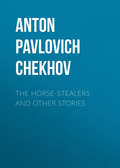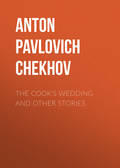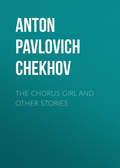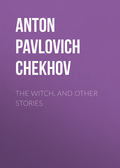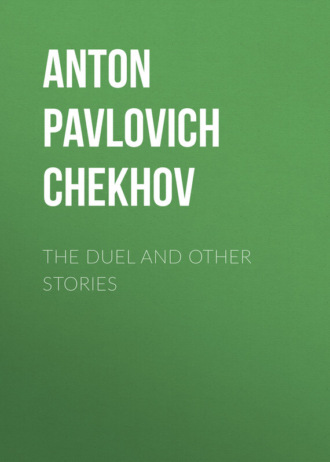
Антон Чехов
The Duel and Other Stories
When he went into Samoylenko's, he found Von Koren in the drawing-room. The zoologist had just arrived for dinner, and, as usual, was turning over the album and scrutinising the gentlemen in top-hats and the ladies in caps.
"How very unlucky!" thought Laevsky, seeing him. "He may be in the way. Good-morning."
"Good-morning," answered Von Koren, without looking at him.
"Is Alexandr Daviditch at home?"
"Yes, in the kitchen."
Laevsky went into the kitchen, but seeing from the door that Samoylenko was busy over the salad, he went back into the drawing-room and sat down. He always had a feeling of awkwardness in the zoologist's presence, and now he was afraid there would be talk about his attack of hysterics. There was more than a minute of silence. Von Koren suddenly raised his eyes to Laevsky and asked:
"How do you feel after yesterday?"
"Very well indeed," said Laevsky, flushing. "It really was nothing much.."
"Until yesterday I thought it was only ladies who had hysterics, and so at first I thought you had St. Vitus's dance."
Laevsky smiled ingratiatingly, and thought:
"How indelicate on his part! He knows quite well how unpleasant it is for me.."
"Yes, it was a ridiculous performance," he said, still smiling. "I've been laughing over it the whole morning. What's so curious in an attack of hysterics is that you know it is absurd, and are laughing at it in your heart, and at the same time you sob. In our neurotic age we are the slaves of our nerves; they are our masters and do as they like with us. Civilisation has done us a bad turn in that way.."
As Laevsky talked, he felt it disagreeable that Von Koren listened to him gravely, and looked at him steadily and attentively as though studying him; and he was vexed with himself that in spite of his dislike of Von Koren, he could not banish the ingratiating smile from his face.
"I must admit, though," he added, "that there were immediate causes for the attack, and quite sufficient ones too. My health has been terribly shaky of late. To which one must add boredom, constantly being hard up.. the absence of people and general interests.. My position is worse than a governor's."
"Yes, your position is a hopeless one," answered Von Koren.
These calm, cold words, implying something between a jeer and an uninvited prediction, offended Laevsky. He recalled the zoologist's eyes the evening before, full of mockery and disgust. He was silent for a space and then asked, no longer smiling:
"How do you know anything of my position?"
"You were only just speaking of it yourself. Besides, your friends take such a warm interest in you, that I am hearing about you all day long."
"What friends? Samoylenko, I suppose?"
"Yes, he too."
"I would ask Alexandr Daviditch and my friends in general not to trouble so much about me."
"Here is Samoylenko; you had better ask him not to trouble so much about you."
"I don't understand your tone," Laevsky muttered, suddenly feeling as though he had only just realised that the zoologist hated and despised him, and was jeering at him, and was his bitterest and most inveterate enemy.
"Keep that tone for some one else," he said softly, unable to speak aloud for the hatred with which his chest and throat were choking, as they had been the night before with laughter.
Samoylenko came in in his shirt-sleeves, crimson and perspiring from the stifling kitchen.
"Ah, you here?" he said. "Good-morning, my dear boy. Have you had dinner? Don't stand on ceremony. Have you had dinner?"
"Alexandr Daviditch," said Laevsky, standing up, "though I did appeal to you to help me in a private matter, it did not follow that I released you from the obligation of discretion and respect for other people's private affairs."
"What's this?" asked Samoylenko, in astonishment.
"If you have no money," Laevsky went on, raising his voice and shifting from one foot to the other in his excitement, "don't give it; refuse it. But why spread abroad in every back street that my position is hopeless, and all the rest of it? I can't endure such benevolence and friend's assistance where there's a shilling-worth of talk for a ha'p'orth of help! You can boast of your benevolence as much as you please, but no one has given you the right to gossip about my private affairs!"
"What private affairs?" asked Samoylenko, puzzled and beginning to be angry. "If you've come here to be abusive, you had better clear out. You can come again afterwards!"
He remembered the rule that when one is angry with one's neighbour, one must begin to count a hundred, and one will grow calm again; and he began rapidly counting.
"I beg you not to trouble yourself about me," Laevsky went on. "Don't pay any attention to me, and whose business is it what I do and how I live? Yes, I want to go away. Yes, I get into debt, I drink, I am living with another man's wife, I'm hysterical, I'm ordinary. I am not so profound as some people, but whose business is that? Respect other people's privacy."
"Excuse me, brother," said Samoylenko, who had counted up to thirty-five, "but."
"Respect other people's individuality!" interrupted Laevsky. "This continual gossip about other people's affairs, this sighing and groaning and everlasting prying, this eavesdropping, this friendly sympathy.. damn it all! They lend me money and make conditions as though I were a schoolboy! I am treated as the devil knows what! I don't want anything," shouted Laevsky, staggering with excitement and afraid that it might end in another attack of hysterics. "I shan't get away on Saturday, then," flashed through his mind. "I want nothing. All I ask of you is to spare me your protecting care. I'm not a boy, and I'm not mad, and I beg you to leave off looking after me."
The deacon came in, and seeing Laevsky pale and gesticulating, addressing his strange speech to the portrait of Prince Vorontsov, stood still by the door as though petrified.
"This continual prying into my soul," Laevsky went on, "is insulting to my human dignity, and I beg these volunteer detectives to give up their spying! Enough!"
"What's that.. what did you say?" said Samoylenko, who had counted up to a hundred. He turned crimson and went up to Laevsky.
"It's enough," said Laevsky, breathing hard and snatching up his cap.
"I'm a Russian doctor, a nobleman by birth, and a civil councillor," said Samoylenko emphatically. "I've never been a spy, and I allow no one to insult me!" he shouted in a breaking voice, emphasising the last word. "Hold your tongue!"
The deacon, who had never seen the doctor so majestic, so swelling with dignity, so crimson and so ferocious, shut his mouth, ran out into the entry and there exploded with laughter.
As though through a fog, Laevsky saw Von Koren get up and, putting his hands in his trouser-pockets, stand still in an attitude of expectancy, as though waiting to see what would happen. This calm attitude struck Laevsky as insolent and insulting to the last degree.
"Kindly take back your words," shouted Samoylenko.
Laevsky, who did not by now remember what his words were, answered:
"Leave me alone! I ask for nothing. All I ask is that you and German upstarts of Jewish origin should let me alone! Or I shall take steps to make you! I will fight you!"
"Now we understand," said Von Koren, coming from behind the table.
"Mr. Laevsky wants to amuse himself with a duel before he goes away.
I can give him that pleasure. Mr. Laevsky, I accept your challenge."
"A challenge," said Laevsky, in a low voice, going up to the zoologist and looking with hatred at his swarthy brow and curly hair. "A challenge? By all means! I hate you! I hate you!"
"Delighted. To-morrow morning early near Kerbalay's. I leave all details to your taste. And now, clear out!"
"I hate you," Laevsky said softly, breathing hard. "I have hated you a long while! A duel! Yes!"
"Get rid of him, Alexandr Daviditch, or else I'm going," said Von
Koren. "He'll bite me."
Von Koren's cool tone calmed the doctor; he seemed suddenly to come to himself, to recover his reason; he put both arms round Laevsky's waist, and, leading him away from the zoologist, muttered in a friendly voice that shook with emotion:
"My friends.. dear, good.. you've lost your tempers and that's enough.. and that's enough, my friends."
Hearing his soft, friendly voice, Laevsky felt that something unheard of, monstrous, had just happened to him, as though he had been nearly run over by a train; he almost burst into tears, waved his hand, and ran out of the room.
"To feel that one is hated, to expose oneself before the man who hates one, in the most pitiful, contemptible, helpless state. My God, how hard it is!" he thought a little while afterwards as he sat in the pavilion, feeling as though his body were scarred by the hatred of which he had just been the object.
"How coarse it is, my God!"
Cold water with brandy in it revived him. He vividly pictured Von Koren's calm, haughty face; his eyes the day before, his shirt like a rug, his voice, his white hand; and heavy, passionate, hungry hatred rankled in his breast and clamoured for satisfaction. In his thoughts he felled Von Koren to the ground, and trampled him underfoot. He remembered to the minutest detail all that had happened, and wondered how he could have smiled ingratiatingly to that insignificant man, and how he could care for the opinion of wretched petty people whom nobody knew, living in a miserable little town which was not, it seemed, even on the map, and of which not one decent person in Petersburg had heard. If this wretched little town suddenly fell into ruins or caught fire, the telegram with the news would be read in Russia with no more interest than an advertisement of the sale of second-hand furniture. Whether he killed Von Koren next day or left him alive, it would be just the same, equally useless and uninteresting. Better to shoot him in the leg or hand, wound him, then laugh at him, and let him, like an insect with a broken leg lost in the grass – let him be lost with his obscure sufferings in the crowd of insignificant people like himself.
Laevsky went to Sheshkovsky, told him all about it, and asked him to be his second; then they both went to the superintendent of the postal telegraph department, and asked him, too, to be a second, and stayed to dinner with him. At dinner there was a great deal of joking and laughing. Laevsky made jests at his own expense, saying he hardly knew how to fire off a pistol, calling himself a royal archer and William Tell.
"We must give this gentleman a lesson." he said.
After dinner they sat down to cards. Laevsky played, drank wine, and thought that duelling was stupid and senseless, as it did not decide the question but only complicated it, but that it was sometimes impossible to get on without it. In the given case, for instance, one could not, of course, bring an action against Von Koren. And this duel was so far good in that it made it impossible for Laevsky to remain in the town afterwards. He got a little drunk and interested in the game, and felt at ease.
But when the sun had set and it grew dark, he was possessed by a feeling of uneasiness. It was not fear at the thought of death, because while he was dining and playing cards, he had for some reason a confident belief that the duel would end in nothing; it was dread at the thought of something unknown which was to happen next morning for the first time in his life, and dread of the coming night… He knew that the night would be long and sleepless, and that he would have to think not only of Von Koren and his hatred, but also of the mountain of lies which he had to get through, and which he had not strength or ability to dispense with. It was as though he had been taken suddenly ill; all at once he lost all interest in the cards and in people, grew restless, and began asking them to let him go home. He was eager to get into bed, to lie without moving, and to prepare his thoughts for the night. Sheshkovsky and the postal superintendent saw him home and went on to Von Koren's to arrange about the duel.
Near his lodgings Laevsky met Atchmianov. The young man was breathless and excited.
"I am looking for you, Ivan Andreitch," he said. "I beg you to come quickly.."
"Where?"
"Some one wants to see you, some one you don't know, about very important business; he earnestly begs you to come for a minute. He wants to speak to you of something… For him it's a question of life and death.." In his excitement Atchmianov spoke in a strong Armenian accent.
"Who is it?" asked Laevsky.
"He asked me not to tell you his name."
"Tell him I'm busy; to-morrow, if he likes.."
"How can you!" Atchmianov was aghast. "He wants to tell you something very important for you.. very important! If you don't come, something dreadful will happen."
"Strange." muttered Laevsky, unable to understand why Atchmianov was so excited and what mysteries there could be in this dull, useless little town.
"Strange," he repeated in hesitation. "Come along, though; I don't care."
Atchmianov walked rapidly on ahead and Laevsky followed him. They walked down a street, then turned into an alley.
"What a bore this is!" said Laevsky.
"One minute, one minute.. it's near."
Near the old rampart they went down a narrow alley between two empty enclosures, then they came into a sort of large yard and went towards a small house.
"That's Muridov's, isn't it?" asked Laevsky.
"Yes."
"But why we've come by the back yards I don't understand. We might have come by the street; it's nearer.."
"Never mind, never mind.."
It struck Laevsky as strange, too, that Atchmianov led him to a back entrance, and motioned to him as though bidding him go quietly and hold his tongue.
"This way, this way." said Atchmianov, cautiously opening the door and going into the passage on tiptoe. "Quietly, quietly, I beg you.. they may hear."
He listened, drew a deep breath and said in a whisper:
"Open that door, and go in.. don't be afraid."
Laevsky, puzzled, opened the door and went into a room with a low ceiling and curtained windows.
There was a candle on the table.
"What do you want?" asked some one in the next room. "Is it you,
Muridov?"
Laevsky turned into that room and saw Kirilin, and beside him
Nadyezhda Fyodorovna.
He didn't hear what was said to him; he staggered back, and did not know how he found himself in the street. His hatred for Von Koren and his uneasiness – all had vanished from his soul. As he went home he waved his right arm awkwardly and looked carefully at the ground under his feet, trying to step where it was smooth. At home in his study he walked backwards and forwards, rubbing his hands, and awkwardly shrugging his shoulders and neck, as though his jacket and shirt were too tight; then he lighted a candle and sat down to the table..
XVI
"The 'humane studies' of which you speak will only satisfy human thought when, as they advance, they meet the exact sciences and progress side by side with them. Whether they will meet under a new microscope, or in the monologues of a new Hamlet, or in a new religion, I do not know, but I expect the earth will be covered with a crust of ice before it comes to pass. Of all humane learning the most durable and living is, of course, the teaching of Christ; but look how differently even that is interpreted! Some teach that we must love all our neighbours but make an exception of soldiers, criminals, and lunatics. They allow the first to be killed in war, the second to be isolated or executed, and the third they forbid to marry. Other interpreters teach that we must love all our neighbours without exception, with no distinction of plus or minus. According to their teaching, if a consumptive or a murderer or an epileptic asks your daughter in marriage, you must let him have her. If crêtins go to war against the physically and mentally healthy, don't defend yourselves. This advocacy of love for love's sake, like art for art's sake, if it could have power, would bring mankind in the long run to complete extinction, and so would become the vastest crime that has ever been committed upon earth. There are very many interpretations, and since there are many of them, serious thought is not satisfied by any one of them, and hastens to add its own individual interpretation to the mass. For that reason you should never put a question on a philosophical or so-called Christian basis; by so doing you only remove the question further from solution."
The deacon listened to the zoologist attentively, thought a little, and asked:
"Have the philosophers invented the moral law which is innate in every man, or did God create it together with the body?"
"I don't know. But that law is so universal among all peoples and all ages that I fancy we ought to recognise it as organically connected with man. It is not invented, but exists and will exist. I don't tell you that one day it will be seen under the microscope, but its organic connection is shown, indeed, by evidence: serious affections of the brain and all so-called mental diseases, to the best of my belief, show themselves first of all in the perversion of the moral law."
"Good. So then, just as our stomach bids us eat, our moral sense bids us love our neighbours. Is that it? But our natural man through self-love opposes the voice of conscience and reason, and this gives rise to many brain-racking questions. To whom ought we to turn for the solution of those questions if you forbid us to put them on the philosophic basis?"
"Turn to what little exact science we have. Trust to evidence and the logic of facts. It is true it is but little, but, on the other hand, it is less fluid and shifting than philosophy. The moral law, let us suppose, demands that you love your neighbour. Well? Love ought to show itself in the removal of everything which in one way or another is injurious to men and threatens them with danger in the present or in the future. Our knowledge and the evidence tells us that the morally and physically abnormal are a menace to humanity. If so you must struggle against the abnormal; if you are not able to raise them to the normal standard you must have strength and ability to render them harmless – that is, to destroy them."
"So love consists in the strong overcoming the weak."
"Undoubtedly."
"But you know the strong crucified our Lord Jesus Christ," said the deacon hotly.
"The fact is that those who crucified Him were not the strong but the weak. Human culture weakens and strives to nullify the struggle for existence and natural selection; hence the rapid advancement of the weak and their predominance over the strong. Imagine that you succeeded in instilling into bees humanitarian ideas in their crude and elementary form. What would come of it? The drones who ought to be killed would remain alive, would devour the honey, would corrupt and stifle the bees, resulting in the predominance of the weak over the strong and the degeneration of the latter. The same process is taking place now with humanity; the weak are oppressing the strong. Among savages untouched by civilisation the strongest, cleverest, and most moral takes the lead; he is the chief and the master. But we civilised men have crucified Christ, and we go on crucifying Him, so there is something lacking in us… And that something one ought to raise up in ourselves, or there will be no end to these errors."
"But what criterion have you to distinguish the strong from the weak?"
"Knowledge and evidence. The tuberculous and the scrofulous are recognised by their diseases, and the insane and the immoral by their actions."
"But mistakes may be made!"
"Yes, but it's no use to be afraid of getting your feet wet when you are threatened with the deluge!"
"That's philosophy," laughed the deacon.
"Not a bit of it. You are so corrupted by your seminary philosophy that you want to see nothing but fog in everything. The abstract studies with which your youthful head is stuffed are called abstract just because they abstract your minds from what is obvious. Look the devil straight in the eye, and if he's the devil, tell him he's the devil, and don't go calling to Kant or Hegel for explanations."
The zoologist paused and went on:
"Twice two's four, and a stone's a stone. Here to-morrow we have a duel. You and I will say it's stupid and absurd, that the duel is out of date, that there is no real difference between the aristocratic duel and the drunken brawl in the pot-house, and yet we shall not stop, we shall go there and fight. So there is some force stronger than our reasoning. We shout that war is plunder, robbery, atrocity, fratricide; we cannot look upon blood without fainting; but the French or the Germans have only to insult us for us to feel at once an exaltation of spirit; in the most genuine way we shout 'Hurrah!' and rush to attack the foe. You will invoke the blessing of God on our weapons, and our valour will arouse universal and general enthusiasm. Again it follows that there is a force, if not higher, at any rate stronger, than us and our philosophy. We can no more stop it than that cloud which is moving upwards over the sea. Don't be hypocritical, don't make a long nose at it on the sly; and don't say, 'Ah, old-fashioned, stupid! Ah, it's inconsistent with Scripture!' but look it straight in the face, recognise its rational lawfulness, and when, for instance, it wants to destroy a rotten, scrofulous, corrupt race, don't hinder it with your pilules and misunderstood quotations from the Gospel. Leskov has a story of a conscientious Danila who found a leper outside the town, and fed and warmed him in the name of love and of Christ. If that Danila had really loved humanity, he would have dragged the leper as far as possible from the town, and would have flung him in a pit, and would have gone to save the healthy. Christ, I hope, taught us a rational, intelligent, practical love."
"What a fellow you are!" laughed the deacon. "You don't believe in
Christ. Why do you mention His name so often?"
"Yes, I do believe in Him. Only, of course, in my own way, not in yours. Oh, deacon, deacon!" laughed the zoologist; he put his arm round the deacon's waist, and said gaily: "Well? Are you coming with us to the duel to-morrow?"
"My orders don't allow it, or else I should come."
"What do you mean by 'orders'?"
"I have been consecrated. I am in a state of grace."
"Oh, deacon, deacon," repeated Von Koren, laughing, "I love talking to you."
"You say you have faith," said the deacon. "What sort of faith is it? Why, I have an uncle, a priest, and he believes so that when in time of drought he goes out into the fields to pray for rain, he takes his umbrella and leather overcoat for fear of getting wet through on his way home. That's faith! When he speaks of Christ, his face is full of radiance, and all the peasants, men and women, weep floods of tears. He would stop that cloud and put all those forces you talk about to flight. Yes.. faith moves mountains."
The deacon laughed and slapped the zoologist on the shoulder.
"Yes." he went on; "here you are teaching all the time, fathoming the depths of the ocean, dividing the weak and the strong, writing books and challenging to duels – and everything remains as it is; but, behold! some feeble old man will mutter just one word with a holy spirit, or a new Mahomet, with a sword, will gallop from Arabia, and everything will be topsy-turvy, and in Europe not one stone will be left standing upon another."
"Well, deacon, that's on the knees of the gods."
"Faith without works is dead, but works without faith are worse still – mere waste of time and nothing more."
The doctor came into sight on the sea-front. He saw the deacon and the zoologist, and went up to them.
"I believe everything is ready," he said, breathing hard. "Govorovsky and Boyko will be the seconds. They will start at five o'clock in the morning. How it has clouded over," he said, looking at the sky. "One can see nothing; there will be rain directly."
"I hope you are coming with us?" said the zoologist.
"No, God preserve me; I'm worried enough as it is. Ustimovitch is going instead of me. I've spoken to him already."
Far over the sea was a flash of lightning, followed by a hollow roll of thunder.
"How stifling it is before a storm!" said Von Koren. "I bet you've been to Laevsky already and have been weeping on his bosom."
"Why should I go to him?" answered the doctor in confusion. "What next?"
Before sunset he had walked several times along the boulevard and the street in the hope of meeting Laevsky. He was ashamed of his hastiness and the sudden outburst of friendliness which had followed it. He wanted to apologise to Laevsky in a joking tone, to give him a good talking to, to soothe him and to tell him that the duel was a survival of mediæval barbarism, but that Providence itself had brought them to the duel as a means of reconciliation; that the next day, both being splendid and highly intelligent people, they would, after exchanging shots, appreciate each other's noble qualities and would become friends. But he could not come across Laevsky.
"What should I go and see him for?" repeated Samoylenko. "I did not insult him; he insulted me. Tell me, please, why he attacked me. What harm had I done him? I go into the drawing-room, and, all of a sudden, without the least provocation: 'Spy!' There's a nice thing! Tell me, how did it begin? What did you say to him?"
"I told him his position was hopeless. And I was right. It is only honest men or scoundrels who can find an escape from any position, but one who wants to be at the same time an honest man and a scoundrel – it is a hopeless position. But it's eleven o'clock, gentlemen, and we have to be up early to-morrow."
There was a sudden gust of wind; it blew up the dust on the sea-front, whirled it round in eddies, with a howl that drowned the roar of the sea.
"A squall," said the deacon. "We must go in, our eyes are getting full of dust."
As they went, Samoylenko sighed and, holding his hat, said:
"I suppose I shan't sleep to-night."
"Don't you agitate yourself," laughed the zoologist. "You can set your mind at rest; the duel will end in nothing. Laevsky will magnanimously fire into the air – he can do nothing else; and I daresay I shall not fire at all. To be arrested and lose my time on Laevsky's account – the game's not worth the candle. By the way, what is the punishment for duelling?"
"Arrest, and in the case of the death of your opponent a maximum of three years' imprisonment in the fortress."
"The fortress of St. Peter and St. Paul?"
"No, in a military fortress, I believe."
"Though this fine gentleman ought to have a lesson!"
Behind them on the sea, there was a flash of lightning, which for an instant lighted up the roofs of the houses and the mountains. The friends parted near the boulevard. When the doctor disappeared in the darkness and his steps had died away, Von Koren shouted to him:
"I only hope the weather won't interfere with us to-morrow!"
"Very likely it will! Please God it may!"
"Good-night!"
"What about the night? What do you say?"
In the roar of the wind and the sea and the crashes of thunder, it was difficult to hear.
"It's nothing," shouted the zoologist, and hurried home.
XVII
"Upon my mind, weighed down with woe,
Crowd thoughts, a heavy multitude:
In silence memory unfolds
Her long, long scroll before my eyes.
Loathing and shuddering I curse
And bitterly lament in vain,
And bitter though the tears I weep
I do not wash those lines away."
PUSHKIN.
Whether they killed him next morning, or mocked at him – that is, left him his life – he was ruined, anyway. Whether this disgraced woman killed herself in her shame and despair, or dragged on her pitiful existence, she was ruined anyway.
So thought Laevsky as he sat at the table late in the evening, still rubbing his hands. The windows suddenly blew open with a bang; a violent gust of wind burst into the room, and the papers fluttered from the table. Laevsky closed the windows and bent down to pick up the papers. He was aware of something new in his body, a sort of awkwardness he had not felt before, and his movements were strange to him. He moved timidly, jerking with his elbows and shrugging his shoulders; and when he sat down to the table again, he again began rubbing his hands. His body had lost its suppleness.
On the eve of death one ought to write to one's nearest relation. Laevsky thought of this. He took a pen and wrote with a tremulous hand:
"Mother!"
He wanted to write to beg his mother, for the sake of the merciful God in whom she believed, that she would give shelter and bring a little warmth and kindness into the life of the unhappy woman who, by his doing, had been disgraced and was in solitude, poverty, and weakness, that she would forgive and forget everything, everything, everything, and by her sacrifice atone to some extent for her son's terrible sin. But he remembered how his mother, a stout, heavily-built old woman in a lace cap, used to go out into the garden in the morning, followed by her companion with the lap-dog; how she used to shout in a peremptory way to the gardener and the servants, and how proud and haughty her face was – he remembered all this and scratched out the word he had written.
There was a vivid flash of lightning at all three windows, and it was followed by a prolonged, deafening roll of thunder, beginning with a hollow rumble and ending with a crash so violent that all the window-panes rattled. Laevsky got up, went to the window, and pressed his forehead against the pane. There was a fierce, magnificent storm. On the horizon lightning-flashes were flung in white streams from the storm-clouds into the sea, lighting up the high, dark waves over the far-away expanse. And to right and to left, and, no doubt, over the house too, the lightning flashed.
"The storm!" whispered Laevsky; he had a longing to pray to some one or to something, if only to the lightning or the storm-clouds. "Dear storm!"
He remembered how as a boy he used to run out into the garden without a hat on when there was a storm, and how two fair-haired girls with blue eyes used to run after him, and how they got wet through with the rain; they laughed with delight, but when there was a loud peal of thunder, the girls used to nestle up to the boy confidingly, while he crossed himself and made haste to repeat: "Holy, holy, holy.." Oh, where had they vanished to! In what sea were they drowned, those dawning days of pure, fair life? He had no fear of the storm, no love of nature now; he had no God. All the confiding girls he had ever known had by now been ruined by him and those like him. All his life he had not planted one tree in his own garden, nor grown one blade of grass; and living among the living, he had not saved one fly; he had done nothing but destroy and ruin, and lie, lie..



